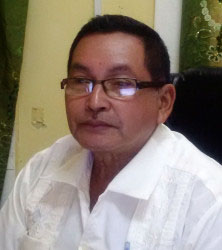Although Amerindian Heritage Month celebrations have been cancelled as a result of the COVID-19 pandemic, Regional Chairman of Region Nine Bryan Allicock yesterday revealed that persons in communities affected by the disease have still been hosting celebratory activities and this has resulted in the increase of cases within the region.
Allicock had previously reported that there were only six active coronavirus cases in the region. The number subsequently fell to four active cases but recently new COVID-19 cases were detected and these currently stand at 16.
According to Allicock, although they have been trying to educate persons about the disease, people are still celebrating Heritage Month despite the measures in place. “We are educating them but now that it’s Heritage Month, everybody wants to celebrate and even though they trying to celebrate in family structures and [with] friends alone with not much gathering, it’s still spreading the disease because they are not observing the protocols like wearing masks and social distancing,” he said.
He noted that even if persons wear their masks, they are eventually discarded as celebratory activities usually involve the consuming of food and alcohol. Further, he stated that the increase of COVID-19 cases is inevitable as a result of this and added that there was a brief period when the region stopped recording active COVID-19 cases.
However, he says with September coming to an end, they are hoping that the people would desist from hosting or participating in celebratory activities and the region will be able to curb the spread of the disease.
Allicock added that they are continuing with their public awareness campaigns, especially in Lethem, which is the region’s most populated area and serves as the main shopping centre for everyone in the region. He noted that charging persons for breaching guidelines and the curfew have proven to be effective in the region but there are still a few brazen individuals who continue to disregard the measures instituted by the Health Ministry to curb the spread of the disease.
In addition, Allicock said there is also the issue of Venezuelan immigrants not understanding the measures that have been imposed on the region.
“The Venezuelans are here and we trying to work and educate them about the laws and legislation that came out and that they will have to observe it but still we find them going out during the nights,” he said.
In this regard, Allicock disclosed that a few Venezuelan migrants are still entering the region and they are being placed in quarantine. To date, no Venezuelan living in Lethem has tested positive for the disease.
Meanwhile, as it relates to the ongoing engagements with Brazilian officials on testing samples collected in the region, Allicock stated that once the Health Minister Dr. Frank Anthony gives the go-ahead, they are hoping to test 1,000 per month, especially since the owners of the laboratory in Brazil said that the more samples sent, the cheaper the cost will be.
If this is approved by Anthony, he said, they are hoping to test the entire region. At this point, he said, they are still in talks and nothing has been agreed to as yet.
Up to Sunday, the Health Ministry said that the region had recorded a total of 340 COVID-19 cases.






